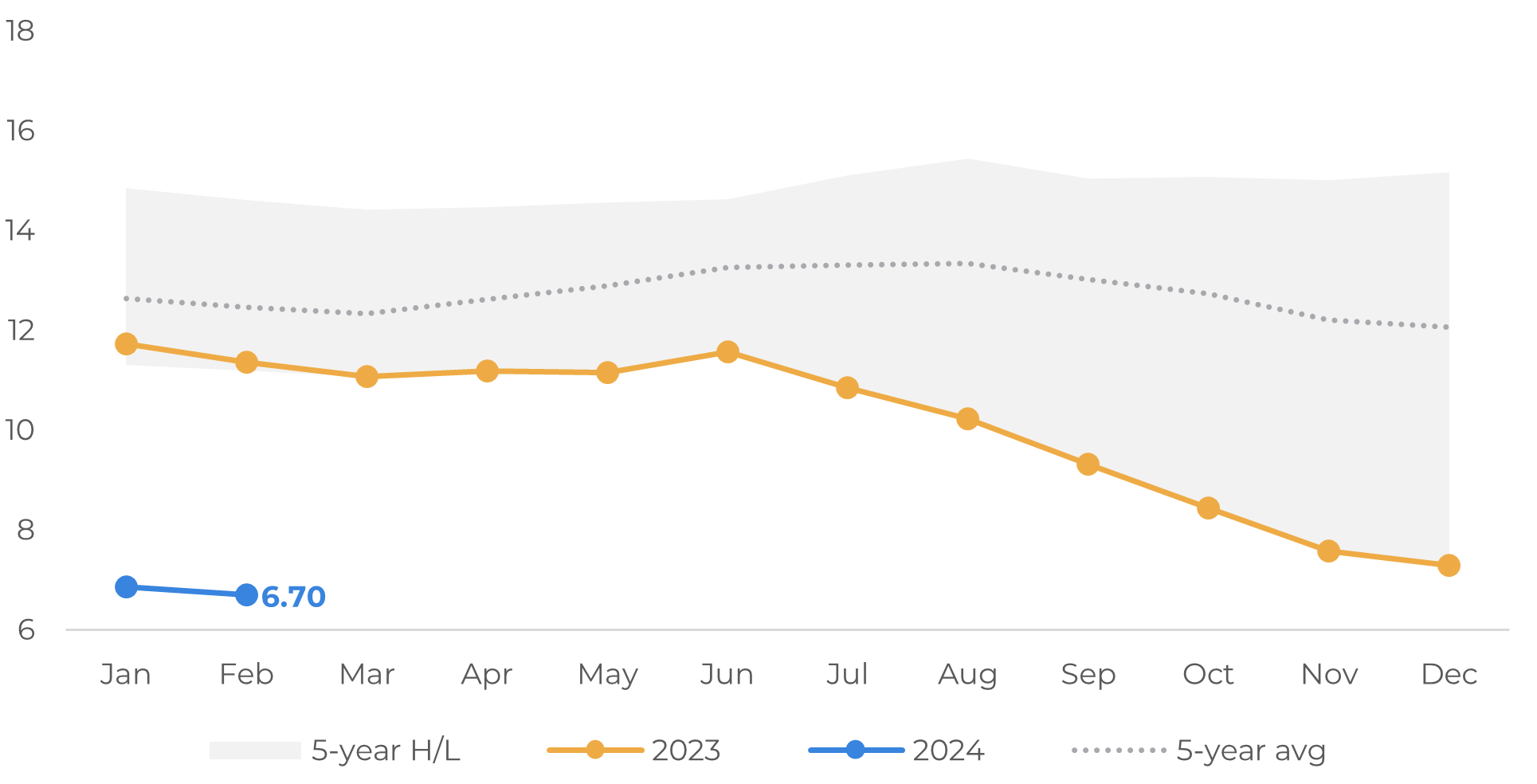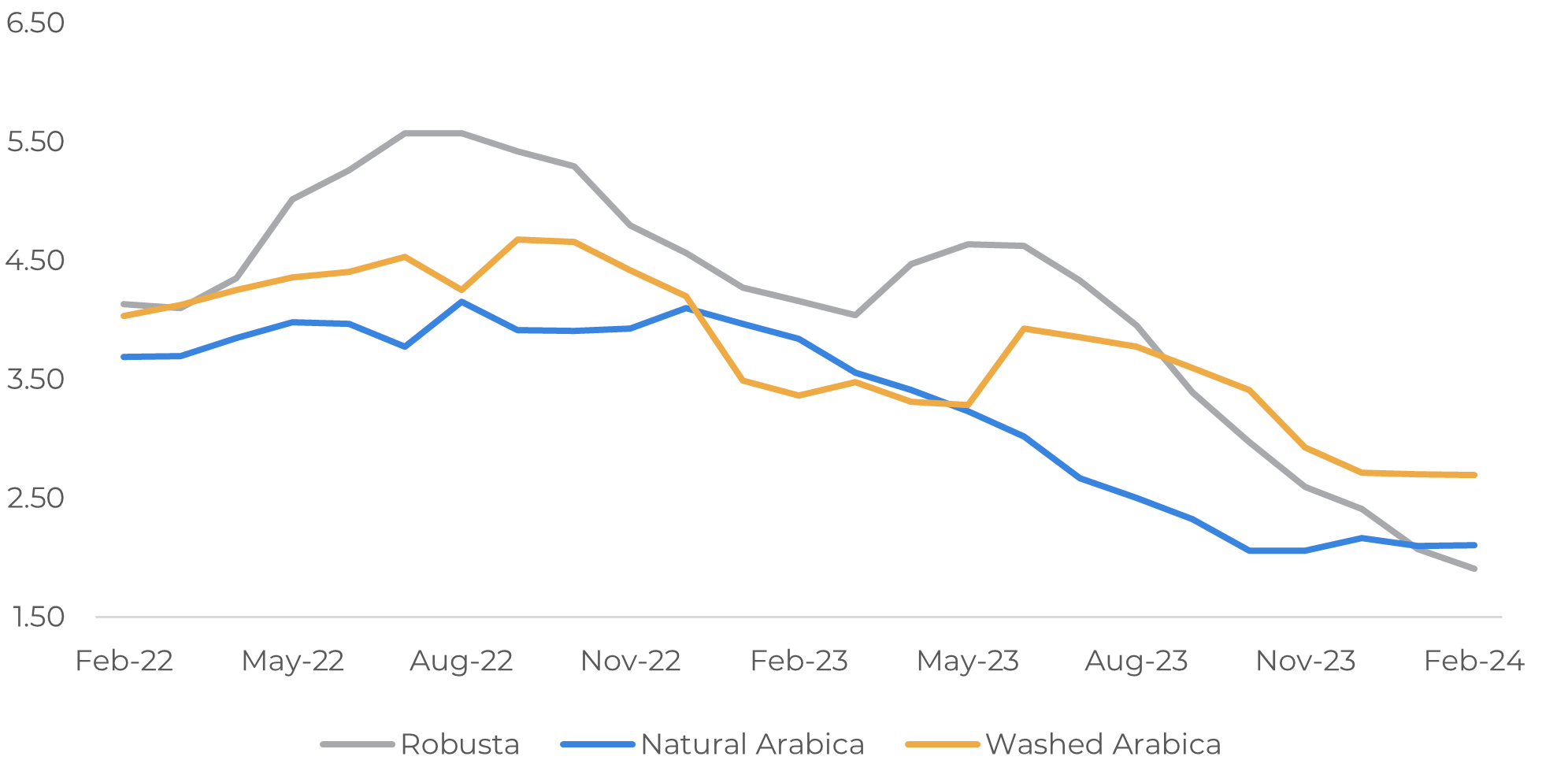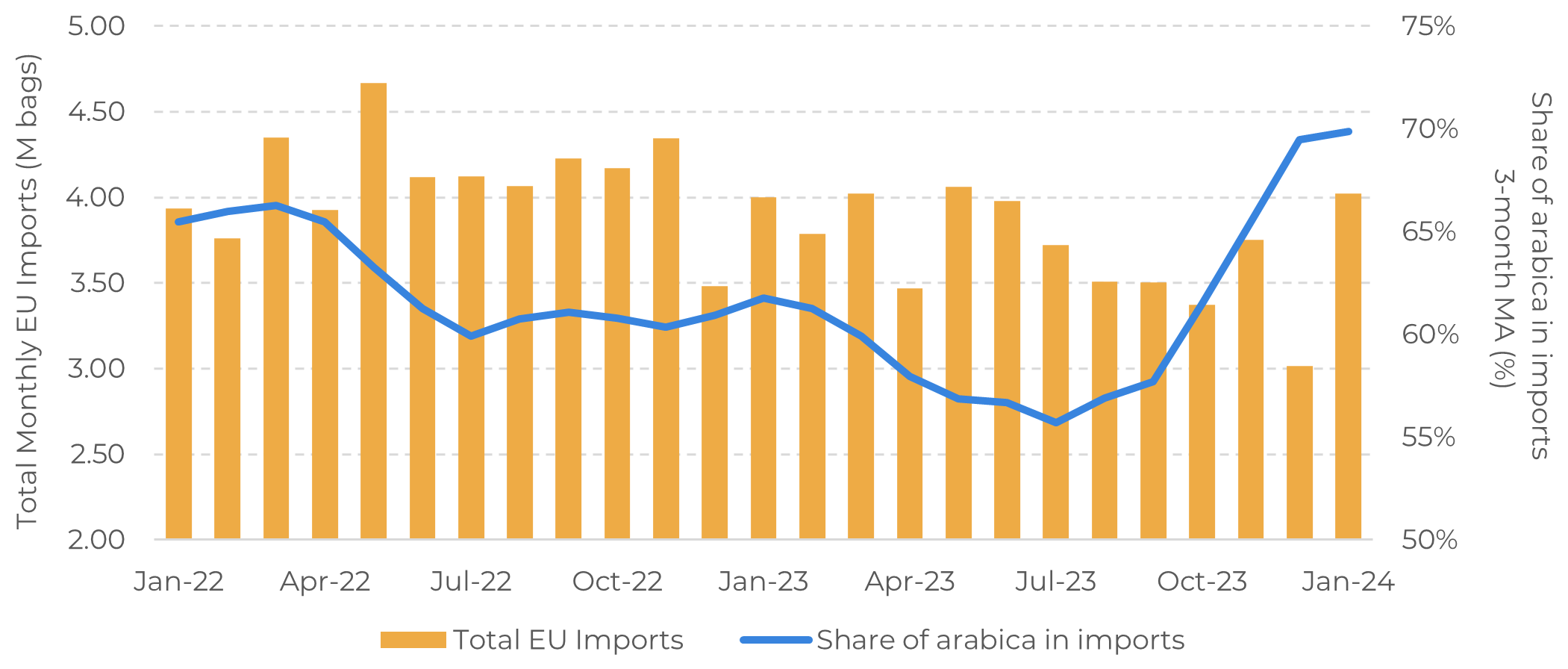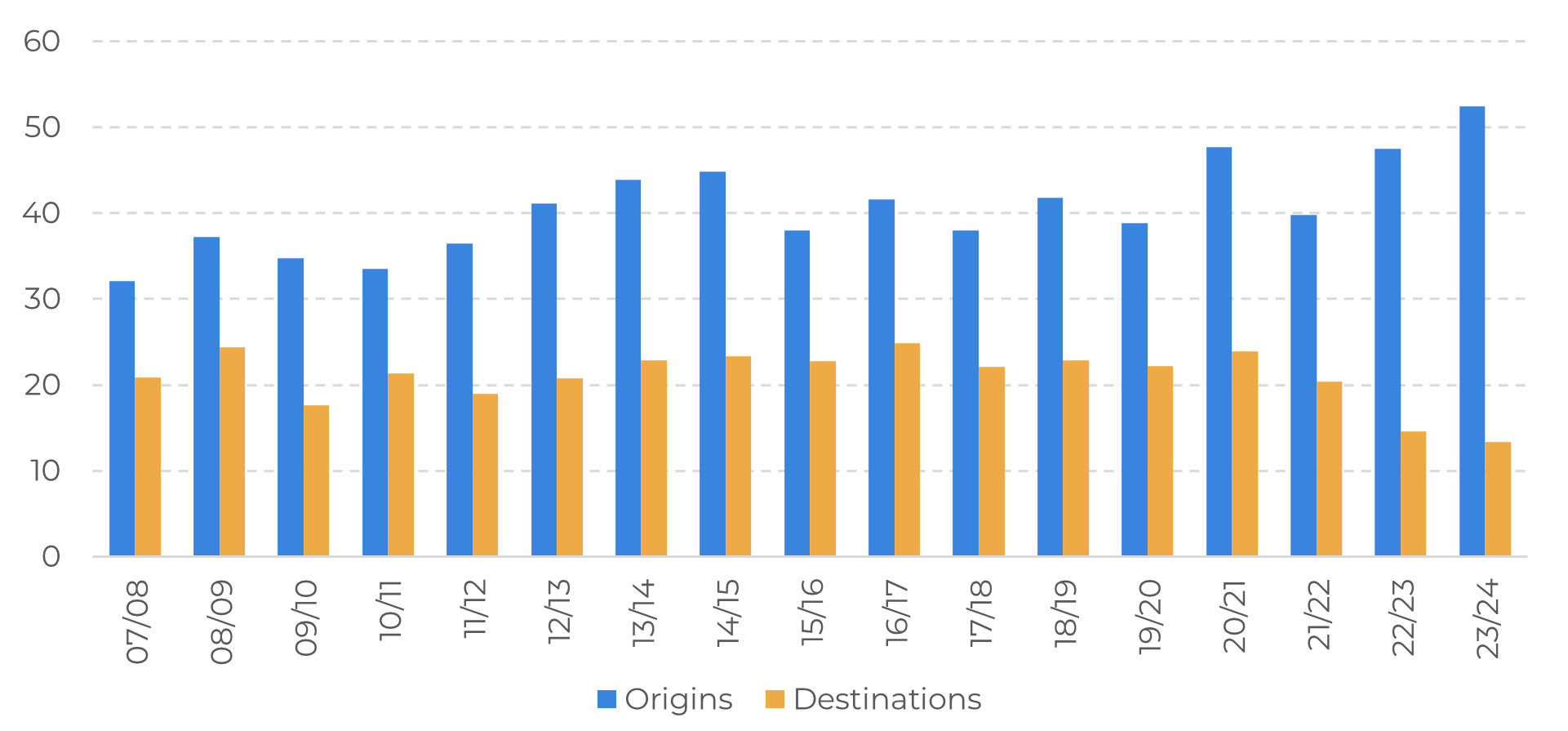
Mar 28
/
Natália Gandolphi
Coffee Weekly Report - 2024 03 28
Back to main blog page
- The European Coffee Federation's recent report underscores a notable decline in coffee stocks, plunging to 6.70M bags, down by a substantial 4.65M bags compared to the previous year.
- This decline, primarily fueled by robusta, presents significant supply challenges within the European Union. While washed arabica stocks remain relatively stable, robusta stocks hit a low of 1.9M bags, comprising only 28% of total stocks, a 10 p. p. decrease from expectations.
- Arabica imports now constitute 70% of EU imports, indicating a shift in consumer preferences. Economic factors, including interest rate hikes, contribute to this dynamic, supporting prices despite higher stocks in coffee origins.
- The market is witnessing a transition towards arabica due to arbitrage considerations, hinting at ongoing adjustments in coffee trade dynamics. These developments emphasize the importance of monitoring economic indicators and consumer trends in shaping coffee market dynamics.
ECF Stocks: Market caught off guard
Following up on last week’s report about expectations regarding demand through the European Union lens, this week we will add to the analysis using the latest European Coffee Federation stocks release, with figures from January and February 2024.
Stocks fell to a staggering 6.70M bags low, which represents a decrease of 4.65M bags when compared to the same period last year (even though the monthly decrease was not far from the seasonal pattern, -2% vs. -1.3%).
The results were very bullish – even though the market was already working with lower stock levels for the region, the newly reached levels present a whole different scale of challenges for supply in the European Union.
The decrease was especially driven by robusta; washed arabica stocks remained roughly unchanged (-10K MoM), representing the higher share across coffee types (2.6M bags, or 40% of the total). Natural arabicas had a small increase (+8K bags, to 2.1M bags), and robusta stocks fell by 170K bags, reaching a low of 1.9M bags – now making up only 28% of the total stocks, 10 p.p. less than what would be expected.
Figure 1: European Coffee Federation Stocks (M bags)

Source: European Coffee Federation
Figure 2: European Coffee Federation Stocks, by Type (M bags)

Source: European Coffee Federation
Imports’ figures explain the trend very well: destinations have started the switch between arabica and robusta, but there’s still some way until it is solidified. The share of arabica in European Union imports increased to 70% in the 3-month moving average ending in January.
It’s important to note that destinations have not dealt with the current macroeconomic scenario before, which led to a decrease in stocks (in addition to region-specific characteristics as well). Considering that the weaker side always yields, higher stocks in origins are momentarily overlooked as a bearish factor.
In this sense, destinations are once again importing more arabica, due to considerations regarding the arbitrage, which has been approaching the record low levels (close to ~22 c/lb, reported in 2017). In the meantime, stocks will continue to reflect the aftermath of higher interest rates in those regions, providing support to prices.
Figure 3: Total EU Imports, Share of Arabica in Imports

Source: Eurostat, hEDGEpoint
Figure 4: Ending Stocks – Origins and Destinations (M bags)

Source: hEDGEpoint
In Summary
The European Coffee Federation's latest report reveals a significant decrease in coffee stocks, hitting a low of 6.70M bags, down 4.65M bags from last year. This decline, driven mainly by robusta, poses challenges for supply in the European Union.
Arabica imports are increasing, comprising 70% of imports, while robusta stocks drop to 28% of the total. Economic factors, including interest rate hikes, contribute to this trend, supporting prices despite higher stocks in coffee origins. The market sees a shift towards arabica due to arbitrage considerations, indicating ongoing adjustments in coffee trade dynamics.
Weekly Report — Coffee
Written by Natália Gandolphi
natalia.gandolphi@hedgepointglobal.com
natalia.gandolphi@hedgepointglobal.com
Reviewed by Laleska Moda
laleska.moda@hedgepointglobal.com
www.hedgepointglobal.com
Disclaimer
This document has been prepared by hEDGEpoint Global Markets LLC and its affiliates ("HPGM") exclusively for informational and instructional purposes, without the purpose of creating obligations or commitments with third parties, and is not intended to promote an offer, or solicitation of an offer, to sell or buy any securities or investment products. HPGM and its associates expressly disclaim any use of the information contained herein that may result in direct or indirect damage of any kind. If you have any questions that are not resolved in the first instance of contact with the client (client.services@hedgepointglobal.com), please contact our internal ombudsman channel (ouvidoria@hedgepointglobal.com) or 0800-878-8408 (for clients in Brazil only).
Contact us
hedgepointhub.support@hedgepointglobal.com
ouvidoria@hedgepointglobal.com
Funchal Street, 418, 18º floor - Vila Olímpia São Paulo, SP, Brasil
Check our general terms and important notices.
This page has been prepared by Hedgepoint Schweiz AG and its affiliates (“Hedgepoint”) solely for informational and instructional purposes, without the purpose of instituting obligations or commitments to third parties, nor is it intended to promote an offer, or solicitation of an offer of sale or purchase relating to any securities, commodities interests or investment products. Hedgepoint and its associates expressly disclaim any use of the information contained herein that directly or indirectly result in damages or damages of any kind. Information is obtained from sources which we believe to be reliable, but we do not warrant or guarantee the timeliness or accuracy of this information. The trading of commodities interests such as futures, options, and swaps involves substantial risk of loss and may not be suitable for all investors. You should carefully consider wither such trading is suitable for you in light of your financial condition. Past performance is not necessarily indicative of future results. Customers should rely on their own independent judgement and/or advisors before entering in any transaction.Hedgepoint does not provide legal, tax or accounting advice and you are responsible for seeking any such advice separately.Hedgepoint Schweiz AG is organized, incorporated, and existing under the laws of Switzerland, is filiated to ARIF, the Association Romande des Intermédiaires Financiers, which is a FINMA-authorized Self-Regulatory Organization. Hedgepoint Commodities LLC is organized, incorporated, and existing under the laws of the USA, and is authorized and regulated by the Commodity Futures Trading Commission (CFTC) and a member of the National Futures Association (NFA) to act as an Introducing Broker and Commodity Trading Advisor. HedgePoint Global Markets Limited is Regulated by the Dubai Financial Services Authority. The content is directed at Professional Clients and not Retail Clients. Hedgepoint Global Markets PTE. Ltd is organized, incorporated, and existing under the laws of Singapore, exempted from obtaining a financial services license as per the Second Schedule of the Securities and Futures (Licensing and Conduct of Business) Act, by the Monetary Authority of Singapore (MAS). Hedgepoint Global Markets DTVM Ltda. is authorized and regulated in Brazil by the Central Bank of Brazil (BCB) and the Brazilian Securities Commission (CVM). Hedgepoint Serviços Ltda. is organized, incorporated, and existing under the laws of Brazil. Hedgepoint Global Markets S.A. is organized, incorporated, and existing under the laws of Uruguay. In case of questions not resolved by the first instance of customer contact (client.services@Hedgepointglobal.com), please contact internal ombudsman channel (ombudsman@hedgepointglobal.com – global or ouvidoria@hedgepointglobal.com – Brazil only) or call 0800-8788408 (Brazil only).Integrity, ethics, and transparency are values that guide our culture. To further strengthen our practices, Hedgepoint has a whistleblower channel for employees and third-parties by e-mail ethicline@hedgepointglobal.com or forms Ethic Line – Hedgepoint Global Markets.Security note: All contacts with customers and partners are conducted exclusively through our domain @hedgepointglobal.com. Do not accept any information, bills, statements or requests from different domains and pay special attention to any variations in letters or spelling, as they may indicate a fraudulent situation.“HedgePoint” and the “HedgePoint” logo are marks for the exclusive use of HedgePoint and/or its affiliates. Use or reproduction is prohibited, unless expressly authorized by HedgePoint. Furthermore, the use of any other marks in this document has been authorized for identification purposes only. It does not, therefore, imply any rights of HedgePoint in these marks or imply endorsement, association or seal by the owners of these marks with HedgePoint or its affiliates.
We have updated our Terms & Conditions to reflect improvements to our platform, data handling practices, and the overall experience we provide to our clients.
To continue using the Hedgepoint HUB, please review and accept the updated terms.

